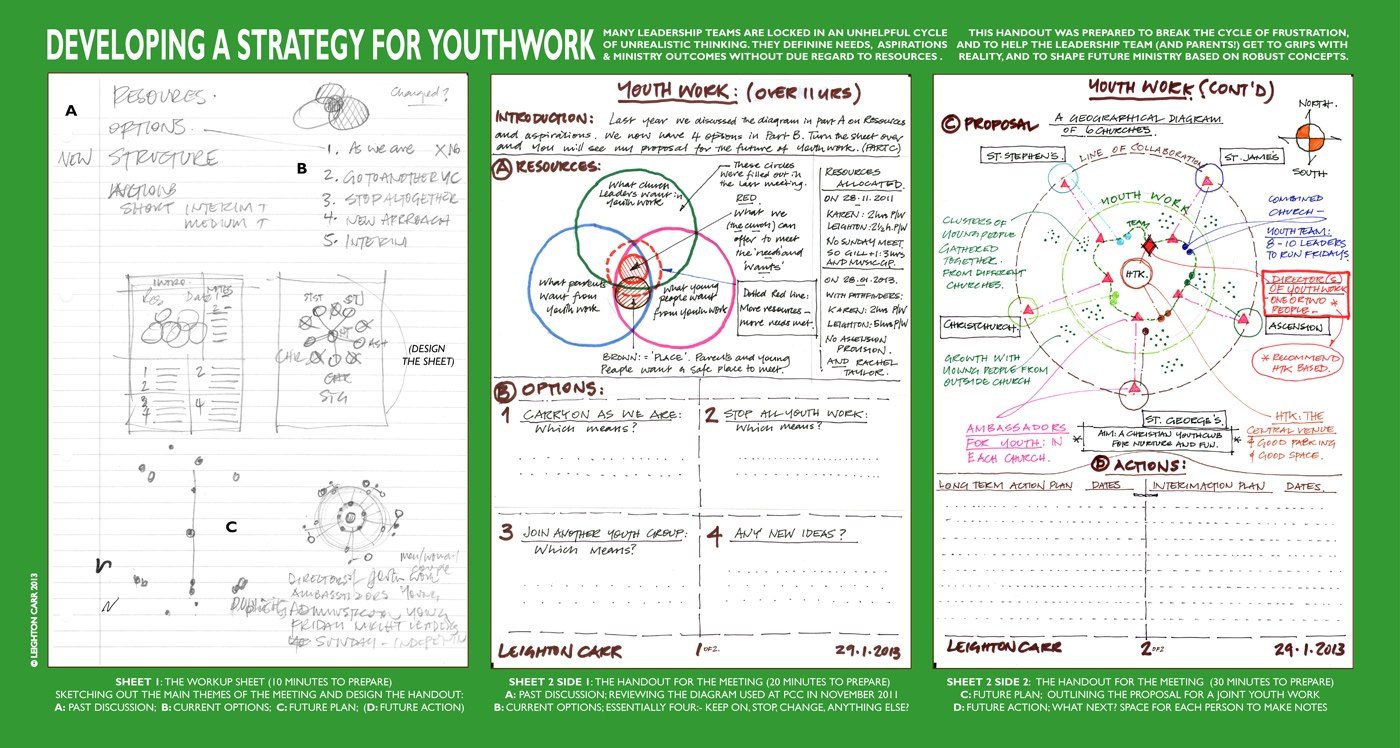After nearly four years of trying and not succeeding to establish a strong youth work we need a new direction.\r\n\r\nCollaboration across churches is the way forward, but it’s hard enough trying to work with a handful of leaders in one church let alone twenty or more leaders across six churches in four parishes. Recognising the need doesn’t always overcome parochial interests.\r\n\r\nWhat’s needed is a clear structure that limits uncertainty and allows, even compels, leaders to buy into it because it’s so possible and so obvious it would be churlish not to.\r\n\r\nThe key words to describe it will probably have to include simple, multi-level, accessible, empowering, flexible yet strong.\r\n\r\nThis is my offering. let’s see how it goes down tonight!\r\n\r\nTo zoom in further click here\r\n\r\n
Month: January 2013
Language problems in Leadership
The operation of much church leadership betrays a simplistic understanding of the inherent complexity of the interaction of the personal gifts of the leader. Nowhere is this more clear than in the use of language and the different effects that the same words from the same person can have on the same people.\r\n\r\nOn two occasions recently I noticed this problem and it gave me cause to stop and think about my own work.\r\n\r\nThe first was during a presentation on the nature of evangelism. Halfway through a perfectly reasonable explanation of some system or other I found myself wondering where the Gospel had gone? I understood the words being said but I didn’t see the connection between Jesus and his world. It’s not that the presentation was entirely wrong. The words were right and clear but at the same time wrong and obscure. I realised that the presentation helped me think as a leader but not as an evangelist or as a pastor.\r\n\r\nBeing alerted to my own discomfort in this situation I then came across an even more stark example in a private conversation about a sensitive topic. The other person used extreme and dramatic language to sustain their argument, to the point where my naturally middle-of-the-road preference in these situations was misread as careless and lukewarm.\r\n\r\nWhen challenged over this extreme use of language the other person argued that it was important to use hyperbole to motivate a congregation to action. It was about leadership.\r\n\r\nAnd there we were. Stuck on a fundamental difference over holistic ministry.\r\n\r\nIn most churches the ‘leader’ is actually also (and better called) the ‘pastor/teacher’, and hopefully this person ‘does the work of an evangelist’ as Paul encouraged Timothy to do. So that’s four roles in one person as a minimum.\r\n\r\nSo how does hyperbole used in the leader role work in other roles of teacher and pastor?\r\n\r\nBadly!\r\n\r\nThe teacher who uses extreme language to teach teaches without balance, and doesn’t help the process of learning, which after all is what teaching is about (most teachers in church wrongly measure their own quality by how well they perform their function rather than how well people receive and learn, but that’s a whole other subject).\r\n\r\nInstead, the teacher who uses extreme language teaches others to do the same – and there we have cults and sects of all sorts in the making.\r\n\r\nThe pastor who uses extreme language looses credibility as someone who is able to deeply listen and weigh up personal issues.\r\n\r\nInstead, the pastor who uses extreme language teaches his congregation that the language of extremes is the context in which personal relationships are enacted.\r\n\r\nSame person. Same words. Same hearers. Different outcomes.\r\n\r\nAnd it’s inevitable if the ‘Leader’ doesn’t think carefully about how one role impacts on another.\r\n\r\nAs ever, Eugene Peterson puts it much more eloquently:\r\n\r\n”descriptive language is about … and motivational language is for getting people to do things they wouldn’t on their own initiative… but personal language, to express, converse … is the language to and with; love is offered and received, ideas are developed, feelings are articulated, silences are honoured.\r\n
[This is] the language of children, as lovers, in prayer, as poets. And it is conspicuously absent when we are running a church.”
Spontaneous Leadership
Spontaneous leadership, by definition, just happens.\r\n\r\nOver coffee, when a friend needs a problem unravelling.\r\nIn a meeting, when an issue is as stuck as ever.\r\nAt home, when the same argument is being rehearsed around the dinner table.\r\n\r\nIf spontaneous leadership just happens, can we prepare for it?\r\n\r\nYes we can.\r\n\r\nBecause spontaneous leadership draws heavily initiative and influence.\r\n\r\nAnd initiative and influence draw heavily on personal capital and relational capital wisely deposited in the past.\r\n\r\nPersonal capital is work usually done on our own. It is the weight of learning, reflecting, thinking, reviewing, reading, and absorbing experiences accumulated at other times in similar or dissimilar situations.\r\n\r\nIt is this personal capital that lays the ground for spontaneous initiative. Rapid fire synapse connections of recognition bringing things before us into focus.\r\n\r\nRelational capital is the work done with other individuals and teams over a period of time to create an environment of trust and believability. It involves deep listening, open vulnerability, compassionate truth-telling, faithful fulfilment of small promises, and sustained action.\r\n\r\nIt is this relational capital that lays the ground for spontaneous influence. Like a kind of relational synapse connections, the unquestioned recognition that someone doesn’t have to think twice before believing that what is being said is true and the person saying it wants the best for all.\r\n\r\nSo, for spontaneous leadership tomorrow – prepare the ground today.
Leaf (4)
Leaf (3)
Music
Ambitious Ministry: Oxymoron?
Is it right to be ambitious in ministry?\r\n\r\nA pertinent question in this season of job hunting, and not a straightforward one in my experience.\r\n\r\nThe Latin word behind our word ambition means to seek votes, office, popularity or fame. It has the idea of campaigning for support.\r\n\r\nBishop Stephen Neill put it this way when talking to ordinands who were about to be ordained:\r\n\r\n“I am inclined to think that ambition in any ordinary sense of the term is nearly always sinful in ordinary men. I am certain that in the Christian it is always sinful, and that it is most inexcusable of all in the ordained minister”\r\n\r\nThat should put job applications (and rejections) into perspective!
St Augustine’s Islington
It’s a basic premise based on thirty years of problem solving:\r\n\r\nThe Quality of Research determines the Quality of Solutions\r\n\r\nThe wider the frame of reference the broader the perspective available.\r\nThe deeper the subject is mined the richer the solutions become.\r\n\r\nThe opposite is true.\r\n\r\nInadequate Research leads to Inadequate Solutions\r\n\r\nThis is nearly always true of parish ministry. Without a sound understanding of (sometimes arcane) details parish strategies are almost always based on some incomplete premise or another borrowed from a book or a course or from the church’s history or practice or another church.\r\n\r\nWhat sort of research? How could it be used?\r\n\r\nToday I completed a brief overview of St Augustine’s parish in Islington, London. A typical London inner city parish, geographically small, few distinguishing features. Good church building. Committed congregation. The question is, what’s next?\r\n\r\nThe data tells us that nearly 4,000 people in the parish call themselves Christian; and roughly 3,000 people are technically Financially Vulnerable; and nearly 3,000 people are on tax credits. Which is half the working age population. And these may not all be the same people.\r\n\r\nAnd all the reverse details are true too. Half the population are not on benefits, are not financially vulnerable, and do not call themselves Christian.\r\n\r\nAnd there are about 600 pensioners and 1,200 children.\r\n\r\nI’m not sure what that means, but I’m sure it’s better to know than not to know.\r\n\r\nClick here to see the complete details and zoom in, or just look at the map …\r\n
Poetic Prophets – The Languange of Imagination
Is it worth the effort of finding fresh and imaginative ways to describe faith?\r\nRead what Eugene Peterson says about the prophet Zechariah …\r\n……………………………….
\r\n
Zechariah reinvigorated imaginations with his visions and messages.
\r\n
The visions provided images of a sovereign God\r\nthat worked their way into the lives of the people …
\r\n
The messages forged a fresh vocabulary\r\nthat gave energy and credibility\r\nto the long-term purposes of God being worked out in their lives.
\r\n
Zechariah’s enigmatic visions,\r\nworking at multiple levels,\r\nand his poetically charged messages\r\nare still at work,\r\nlike time capsules in the lives of God’s people … releasing
\r\n
insight\r\nand hope\r\nand clarity
\r\n
for the people whom God is using to work out his purposes\r\nin a world that has no language\r\nfor God\r\nand the purposes of God.
\r\n
from Eugene Peterson’s Introduction to Zechariah, The Message




